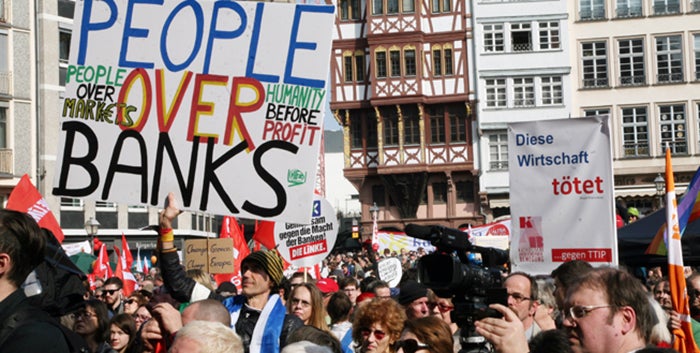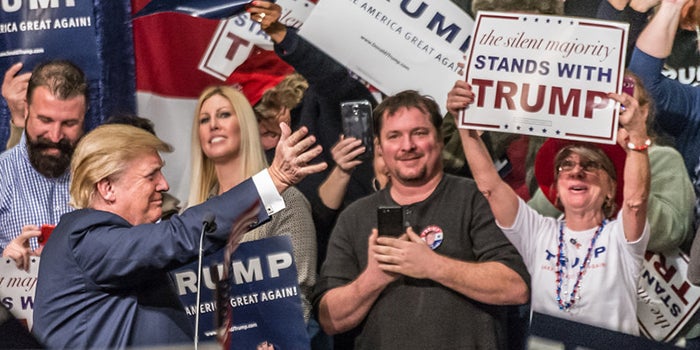

Matthew Rhodes-Purdy is a Visiting Assistant Professor at Boise State University. He received his PhD in government from the University of Texas at Austin. He is an alumnus of the Fulbright Student Program in Chile. His research interests include legitimacy and regime support, populism, attitudes towards ethnic minorities and immigrants, and participatory governance. His work has appeared in Comparative Politics, Political Research Quarterly, Latin American Research Review and Political Studies.
In the last two years, we have witnessed a stunning return of populism to the developed world. Brexit, the first-round success of Marine Le Pen in France, the rise of Bernie Sanders, and the election of Donald Trump all showed the willingness of citizens throughout the developed world to defy the views of political elites. These events raise the question: why have so many become so willing to throw in with charismatic leaders? And why has the global political class so thoroughly failed to convince ordinary people of the wisdom of its preferred policies, often despite strong evidence in their favor?
WHAT IS POLITICAL SYSTEM SUPPORT?
Although unique factors are in play in all these cases, they all seem to stem in part from a widespread and apparently growing antipathy towards political systems throughout the democratic world. The rise of outsiders on both the right and left reveals a deep well of discontent with politics as usual has come to exist worldwide, one from which ambitious outsiders are beginning to draw successfully for the first time in living memory, at least in the advanced democracies.
Political science refers to the attachment to, belief in, and positive attitudes towards an existing political system, including the leaders who govern it, the organizations that compose it (e.g. parties, legislatures, administrative agencies) and the institutions that dictate how it functions as “systemic” or “regime” support. And it appears that support has atrophied to a startling degree throughout the world, with unpredictable and potentially dangerous consequences.

IT’S NOT JUST THE ECONOMY; WHY PROCESS MATTERS FOR POLITICAL SYSTEM SUPPORT
This raises an obvious question: why have so many people grown cool or even outright hostile to the democratic regimes which govern them? Existing research on systemic support can give us only partial and unsatisfactory answers. Such research, almost without exception, argues that citizens judge their political systems primarily on the basis of policy outputs. Which is a technical way of saying that if the economy hums along, unemployment stays low, and the trains run on time, most people will give the political system a firm nod approval.
This is an intuitively appealing framework for looking at regime support, but one which fails to match reality in some fairly serious ways. For example, it seems fairly obvious that the current populist wave has been propelled in part by the 2008 financial crisis, which would seem to conform with the approach to support outlined above. Yet, as I discuss later, comparing countries tends to complicate this picture. The populist wave has been not been systematically stronger in countries that suffered more economic damage or were slower to recover than other countries. Economics plays a role in regime support, but something else is also at work.
Two disparate fields can shed light on this puzzle: democratic theory and social psychology. In my forthcoming book (summarized in this article), I use insights drawn from these areas of study to explain mismatches in governance and support in Latin America, but the theories I develop are equally applicable to the developed world. Democratic theory is a branch of political philosophy that attempts to answer a question with considerable relevance to the issue of support: why should we care about democracy?
To those who argue that systemic support is driven primarily by the competence of government and policy performance, democracy is valuable because it is the best system for ensuing good governance and policy. Yet there is another branch of democratic theory which makes a fundamental insight which can help shed light on the puzzle: how decisions are made are as important as the content of those decisions. In other words, democracy is valuable not because it leads to good choices by governments (although that well might be the case), but because it gives citizens a voice in how the state behaves.
ORGANIZATIONAL JUSTICE AND SYSTEM SUPPORT
Social psychology studies in the field of organizational justice suggests an alternative reason why democracy is important, one that fits the current situation quite a bit better: democracy gives ordinary people a sense of control over what happens to them. By granting citizens a say in how decisions are made, democratic forms of decision-making provide participants a sense of efficacy, or the ability to influence their environment. Psychology also has a lot to say about how people act when they lack efficacy: individuals who feel like powerless victims of fate tend to react very negatively to relatively minor setbacks. Studies in courts and economic firms have shown that undesirable outcomes (like losing a case or being laid off) hit much harder (in terms of emotional and psychological well-being) among those who feel shut out of the decision-making process.
THE 2008 FINANCIAL CRISIS: A FAILURE OF ORGANIZATIONAL JUSTICE?

With the social psychology approach, the role of the 2008 financial crisis in propelling the populist wave forward becomes clearer. The most devastating economic decline since the Great Depression seriously undermined public confidence in governments’ ability to manage and regulate the economy, and not without reason. Millions lost homes, jobs, and life savings. In some cases, government responses to the crisis, though perhaps necessary in order to save the global economic system, made the perception of government ineptitude or even corruption worse. Many saw programs like the Troubled Asset Relief Package (TARP) in the United States as a handout to the very banks and financial powers that caused the crisis in the first place, leaving ordinary citizens holding the bag, so to speak.
The European Union’s response to the crisis was even more problematic. Countries such as Greece and Spain, which faced massive budget deficits because of the economic decline, were ultimately forced to undergo round after round of painful austerity measures (spending cuts and tax increases). This despite the growing consensus (which included the IMF, not usually seen as softhearted in its response to fiscal crises) that some debt forgiveness would be necessary for these countries to dig themselves out of the hole. With all this misery, it is perhaps surprising that citizens did not turn against political systems even more forcefully.
And yet while this explanation seems to make sense, a detailed examination shows it to be lacking. First of all, if the economic pain of the housing crisis is the root cause of weak system support, we might expect support to be weaker in countries that were harder hit, or which recovered more slowly. This is not the case. The United States was among the first countries to crawl out of the wreckage, and yet anti-system candidates have done as well, if not better, here than in European countries like Ireland where recovery was markedly slower and weaker. Outsider candidates and issues (e.g. Brexit) have risen in countries like the UK and France, which were not hit nearly as hard as Greece and Spain.
Some of this might be accounted for differences within countries: there are pockets (such as the Rust Belt states of the Midwestern United States) where speaking of recovery would be a cruel joke, and Donald Trump outperformed expectations in these areas. Yet some things are still amiss. How did Trump manage to convince so many that crime was out of control, despite some of the lowest crime rates in decades? How did he do so well in areas outside the deindustrialized Midwest were the recovery was stronger?
To summarize, we have here a complicated puzzle in which economic grievances and other governance issues play a part, but only a part. Levels of support certainly cratered during the great recession, but there is no neat correlation between the severity of economic decline and the decline in systemic support. And there are some issues, such as crime, trade, and immigration, where public perceptions of government botch jobs seem largely or entirely at odds with reality. In order to fully understand the crisis of support in the democratic world, we need alternative explanations for why reactions to the financial crisis have been so severely negative, even where recovery has been (relatively strong).
ORGANIZATIONAL JUSTICE AND DEMOCRACY IN THE U.S.

To resolve this dilemma, between insufficient and excessive democracy, the Framers created a system that allowed the people a say in politics, but which insulated political leaders (who they assumed would come from a natural aristocracy of the well-educated and wealthy) from popular pressure. Senators were to be appointed, as was the President and justices of the Federal Courts. Later reforms eliminated some of the more elitist elements of the US system (for example, by directly electing Senators and tying the appointment of Presidential electors to the popular vote).
Yet in recent years, additional problems have developed which limit the ability of the people to influence political outcomes. Incumbency advantage is out of control: only ten percent of incumbents are replaced in any given election. Gerrymandering (where legislative districts are drawn to ensure that only one party has a realistic chance of winning) and self-sorting (where people move to areas based on similar political views) mean that very few seats in the House of Representatives are up for grabs; partisan turnover of house seats is a surprisingly rare event. And the Electoral College limits meaningful competition in Presidential campaigns to a handful of swing states.
Finally, the astronomical costs of political campaigns, combined with our electoral system, keep third parties out of the running, limiting competition that might force politicians to be more responsive. In short, the dominant parties in the U.S. have grown unresponsive to public opinion and ineffective without the specter of electoral defeat hanging over their heads to keep them honest. In these circumstances, parties tend to resort to parliamentary maneuvers rather than mobilization of voters to settle disputes, what some scholars have called “institutional combat.”
Similar problems exist in Europe, albeit arising from very different sources. With proportional representation (where seats in the legislature are awarded based on percentage of vote), European systems generally have more competition and more parties, which are thus usually more responsive to popular opinion. However, the emergence of the European Union has limited the ability of European democracies to respond to popular demands. Specifically, EU balanced budget rules have all but forced countries like Greece to adopt brutal austerity measures in response to the economic crisis, as EU countries are not allowed to deficit spend or print money to get out of budget shortfalls.
In short, while both the U.S. and European states are full democracies by most standards, electoral politics have failed to provide the sense of control over the political system that makes democracy worthwhile, due in part to institutional design and in part to unintended consequences. In order to escape this crisis of public confidence, democratic regimes need to reform in ways that make political leaders less autonomous and more responsive to public opinion, especially by increasing party competition.

SYSTEM SUPPORT AND POPULISM: LOOKING FORWARD
If they fail to so reform, discontented citizens will likely continue to make choices and support leaders who are at best a serious risk, and a real threat to democratic systems at worst. Charismatic leaders thrive in environments where systemic support is weak, and such leaders are intrinsically dangerous to democracy. The charismatic bond tends to defy rational evaluation; supporters of charismatics maintain their loyalty even when the leader betrays them or turns out to be incompetent. Donald Trump has flip-flopped on any number of issues, with no apparent weakening in his bases’ loyalty. Hugo Chávez ran the Venezuelan economy into the ground, and yet managed to maintain strong support until his death. In short, it is incredibly difficult to hold charismatic leaders accountable for their failings. If modern democracies cannot reform and convince their citizens that their voices are heard, we are likely to see the procession of populist demagogues continue unabated.